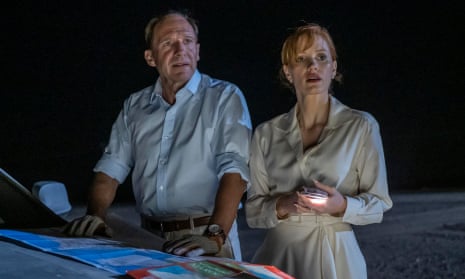There’s an unusual, intoxicating air to writer-director John Michael McDonagh’s latest, and splashiest, film The Forgiven, a wrong-footing combination of crime thriller, dark comedy and shaggy hangout movie. It’s a strange watch – unsure of itself at times, hugely, bullishly confident at others – but one that’s never less than curiously compelling, a mostly convincing return to form after 2016’s underwhelming War on Everyone.
Like his younger brother Martin, McDonagh’s writing is often at its best when it’s at its most deceptively simple: two characters bitching and sniping, dialogue that swiftly goes from a delicate cut to a deep wound. In his adaptation of Lawrence Osborne’s acclaimed novel, his pairing is a married couple: a Brit and an American in Morocco, bored of each other and of their surroundings. David (Ralph Fiennes) is an insufferable alcoholic, spouting awful, bigoted comments about minorities, much to the chagrin of his younger eye-rolling wife Jo (Jessica Chastain), along for the ride but barely awake for it. They’re headed out to the desert for a weekend-long party at an ostentatious estate owned by an eccentric gay couple (Matt Smith, on top-tier form, and Caleb Landry Jones). But there’s an accident on the way there: David hits and kills a local boy with his car. It was dark but David had been drinking and soon the party is interrupted by a dead body and a confusion over what to do with it.
While another film would preoccupy itself with the murkiness of that dilemma, Osborne and McDonagh make the refreshing decision to move on with believable speed, for authorities to be called and for the consequences to be dealt with. It leads to a split, for David and Jo to spend the majority of the film apart as David is made to return to the family home of the dead boy and whatever potential vengeance that might follow while Jo drunkenly lounges around the extravagant home, welcoming the respite. It’s a brief shame as before they’re ripped apart, it’s fun to watch them expertly tear strips off each other, that familiar back-and-forth couple banter that’s maintained the same rat-a-tat rhythm that used to be flirtatious but has soured into a lived-in nastiness. It’s a dynamic that Jo then replicates in part with a fellow guest (Christopher Abbott), who she unashamedly flirts with, closer to her age and devoid of David’s gnarliest qualities, if not entirely so for that would be dull. David’s quest is escapist in a far less enjoyable way but insists upon him an important humbling, a perspective he’d been missing and a delayed realisation of place within the world for someone who had become so dangerously unmoored.
McDonagh’s hit-and-miss film is clearly an adaptation of a far more expansive and detailed novel (themes and supporting characters come and go with swiftness, sometimes frustratingly so) and we end up craving more rather than less (one wonders what a limited series would have looked like). The conflict between the debauched westerners turning a remote desert estate into a garishly lit orgy of strong cocktails and sexual energy (Abbey Lee’s drunk party girl is a hoot) and the locals either quietly working for them or watching with disdain from afar is spiky but pleasingly underplayed, an accepted post-9/11 tension that ultimately puts the former in the realm of wrong, even if some of them wouldn’t see their dismissive and disrespectful behaviour as cruelly ostentatious. There’s a wonderfully crass scene of fireworks, unintentionally timed for maximum awkwardness, that plays brilliantly, as does a quick impactful moment of an employee glumly throwing away an entire basket of pastries after breakfast.
Chastain, a talented actor but one who can too frequently feel miscast, is on fire here, slinking around with a drink in hand and a line of coke to be snorted, flirting and quipping her weekend away, allowed to have actual fun for once rather than the misery she’s usually lumbered with. She has a believably fresh and sexy chemistry with Abbott (even if some of their lines could do with an added zing) and equally easy to buy chemistry with Fiennes, both managing to show a sort of resigned love between their barbs (at times, she’s almost as callous as he). Fiennes is an effectively odious version of a type that often appears in both McDonagh brothers’ work – crass and offensive – veering between Islamophobia to homophobia within the sip of a dirty martini, but his foulness is met with a range of comeuppances, from local boys throwing rocks at his head after a foul rant to something far darker.
As the final act beckons, The Forgiven is perhaps, frustratingly, not quite the sum of its many parts. While the wild tonal shift between drunken excess and hollowing grief can be well-balanced and contrasted, at other times it gives the film a niggling unevenness, not helped by a rather repetitive and plain score that intrudes upon certain scenes and robs them of emotion. The film’s strange scrappy indefinability is both its blessing and curse. We’re left with pieces, interesting on their own and sometimes together, but not quite enough to complete the puzzle.
The Forgiven screened at the Toronto film festival and is released in the UK on 2 September.
